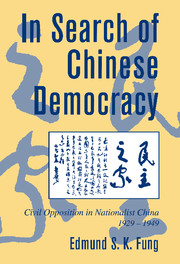Book contents
- Front Matter
- Contents
- Acknowledgments
- A Note on Romanization
- Abbreviations
- Introduction
- 1 The Dictatorial Regime
- 2 Setting the Opposition Agenda: The Issue of Human Rights, 1929–1931
- 3 The National Emergency, 1932–1936: Political and Intellectual Responses
- 4 In Defense of Democracy, 1933–1936
- 5 An Abortive Democratic Experiment: The People's Political Council, 1938–1945
- 6 Wartime Democratic Thought
- 7 The Third Force Movement: The Chinese Democratic League, 1941–1945
- 8 “Peace, Democracy, Unification, and Reconstruction,” 1946
- 9 The Last Stand of Chinese Liberalism
- Conclusion
- Selected Bibliography
- Glossary
- Index
Conclusion
Published online by Cambridge University Press: 22 September 2009
- Front Matter
- Contents
- Acknowledgments
- A Note on Romanization
- Abbreviations
- Introduction
- 1 The Dictatorial Regime
- 2 Setting the Opposition Agenda: The Issue of Human Rights, 1929–1931
- 3 The National Emergency, 1932–1936: Political and Intellectual Responses
- 4 In Defense of Democracy, 1933–1936
- 5 An Abortive Democratic Experiment: The People's Political Council, 1938–1945
- 6 Wartime Democratic Thought
- 7 The Third Force Movement: The Chinese Democratic League, 1941–1945
- 8 “Peace, Democracy, Unification, and Reconstruction,” 1946
- 9 The Last Stand of Chinese Liberalism
- Conclusion
- Selected Bibliography
- Glossary
- Index
Summary
Civil opposition has been studied in this book in the context of a continued search for Chinese democracy during a period when China was dominated by the politics of violence, war, and revolution. We have probed the thoughts and actions of China's “liberal democrats” who represented a minor but significant tradition of liberal opposition in juxtaposition against the mainstream authoritarian tradition of political culture represented by the GMD and the CCP. We have also documented the prodemocracy movement that unfolded amid mounting pressures from Japanese aggression that culminated in an eight-year war. Its starting point was a challenge to the political system characterized by political tutelage, one-party rule, official corruption, and political repression. The Nationalist regime was not merely a military dictatorship but also a personal dictatorship of Chiang Kai-shek. Yet it was a weak dictatorship, a weak garrison state, exercising ineffective control of the country, a fact that aided and abetted the growth of civil opposition.
Beginning in 1929 in protest against human rights violations, the opposition agenda was set for the next twenty years. Of course, civil opposition was not entirely concerned with democracy. To many, democracy simply meant unrelenting opposition to the government and everything it did. But the opposition found a cause dating back to the May Fourth period; this source was anchored in the belief that power could be won and conflict resolved without resorting to violence. In the process, civil opposition, identified with enlightenment (qimeng), became part of the movement for national salvation (jiuwang).
- Type
- Chapter
- Information
- In Search of Chinese DemocracyCivil Opposition in Nationalist China, 1929–1949, pp. 337 - 352Publisher: Cambridge University PressPrint publication year: 2000
- 1
- Cited by



